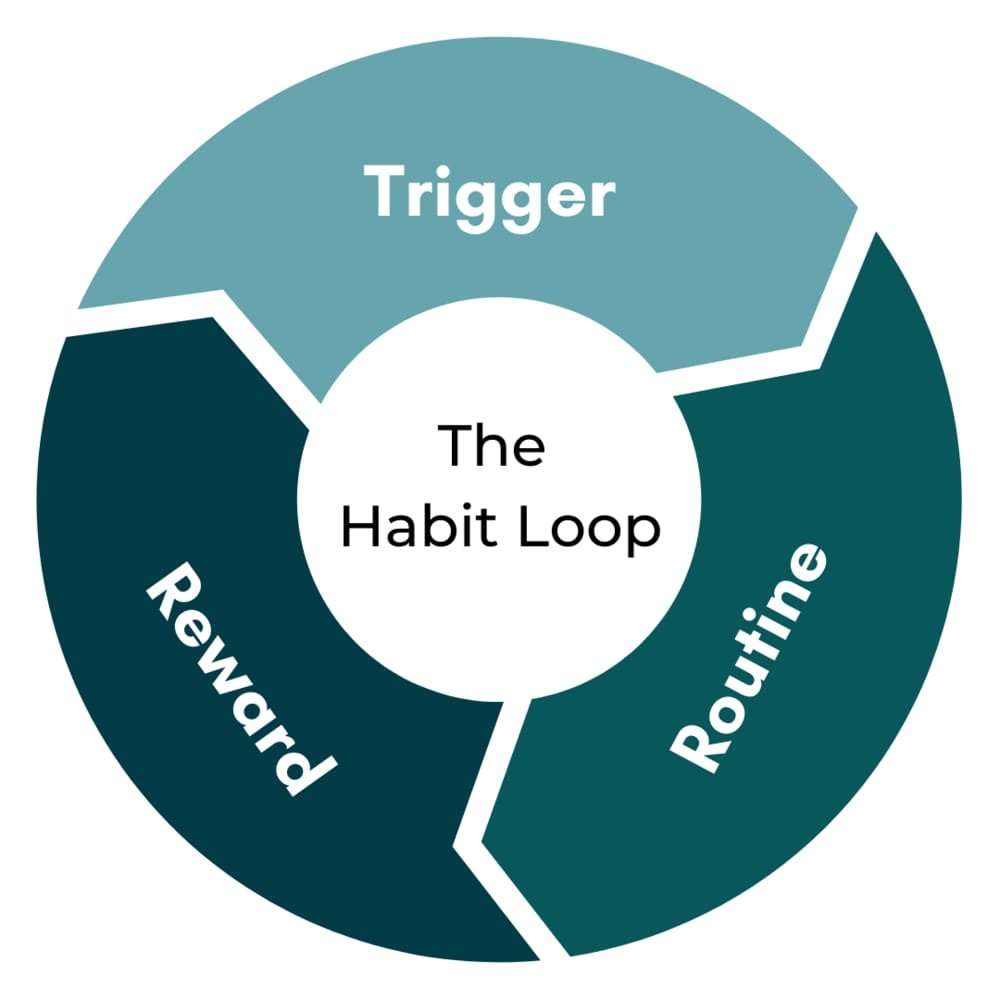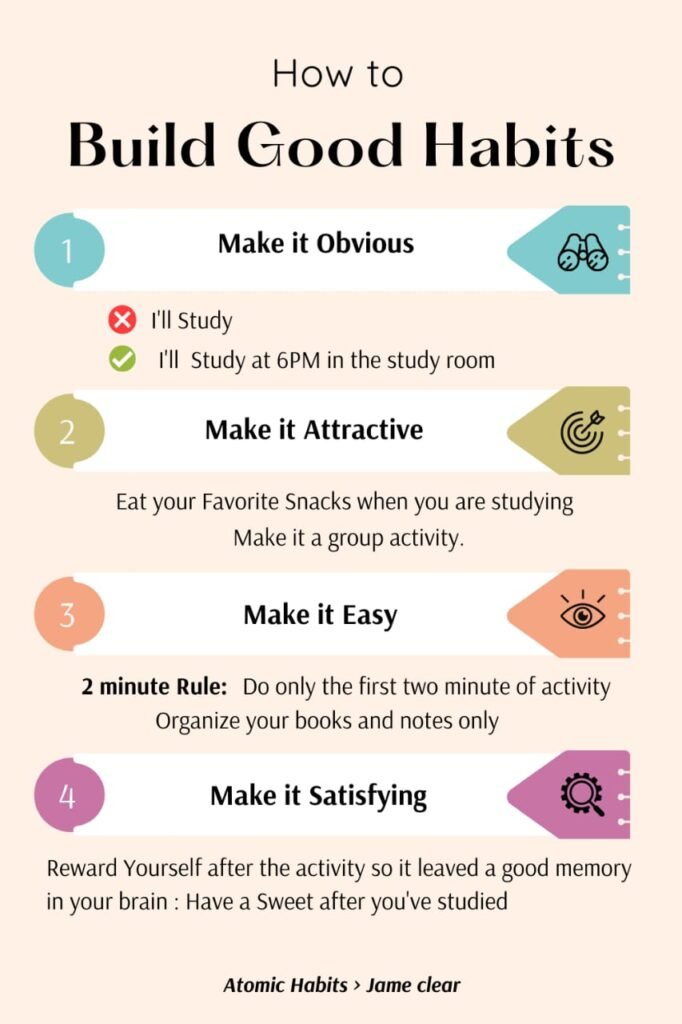
Building and maintaining healthy habits is crucial for leading a balanced and fulfilling life. The process involves more than just deciding to make a change; it requires understanding the psychology behind habit formation, practical strategies for implementation, and ongoing efforts to sustain these habits. This blog will delve into the steps to create and maintain healthy habits, offering actionable tips and insights to help you on your journey.
Understanding Habits
Habits are behaviors that are repeated regularly and tend to occur subconsciously. They are a critical part of our lives, as they free up mental space for other tasks by automating routine actions. Habits can be both positive and negative, affecting our health, productivity, and overall well-being.
The Habit Loop

Charles Duhigg, in his book “The Power of Habit,” describes the habit loop, which consists of three components:
- **Cue**: A trigger that initiates the behavior.
- **Routine**: The behavior itself.
- **Reward**: The benefit you gain from the behavior.
Understanding this loop is essential for building and changing habits. By identifying and modifying these components, you can develop new, healthy habits and eliminate detrimental ones.
Steps to Build Healthy Habits

1. **Identify Your Goals**
Start by defining clear and specific goals. Instead of vague resolutions like “get fit,” opt for more precise objectives like “run three times a week for 30 minutes.” Clear goals provide direction and make it easier to track your progress.
2. **Start Small**
Begin with small, manageable changes. Overwhelming yourself with too many drastic changes at once can lead to burnout. For example, if you want to eat healthier, start by adding one serving of vegetables to your meals each day instead of overhauling your entire diet overnight.
3. **Create a Plan**
Develop a detailed plan that outlines the steps you need to take to achieve your goals. This plan should include the specific actions you’ll take, when and where you’ll perform them, and any resources or support you might need. Having a plan helps to turn abstract goals into concrete actions.
4. **Use Triggers**
Leverage cues or triggers to remind you to perform the desired behavior. These can be existing habits, environmental prompts, or specific times of day. For instance, if you want to develop a habit of stretching every morning, use your alarm clock as a cue to remind you to stretch right after waking up.
5. **Monitor Your Progress**
Track your progress regularly to stay motivated and identify areas where you may need to adjust your approach. Keeping a journal, using a habit-tracking app, or simply marking off days on a calendar can help you stay accountable and visualize your progress.
6. **Stay Consistent**
Consistency is key to habit formation. Aim to perform the new behavior at the same time and place each day to reinforce the habit loop. Over time, the behavior will become automatic, requiring less conscious effort to maintain.
7. **Find Accountability**
Share your goals with friends, family, or a support group. Having someone to hold you accountable can provide extra motivation and encouragement. Additionally, consider finding a habit buddy who is working towards similar goals, so you can support each other.
8. **Celebrate Small Wins**
Acknowledge and celebrate your progress, no matter how small. Positive reinforcement helps to strengthen the habit loop by making the behavior more rewarding. Treat yourself to something enjoyable, like a favorite activity or a small reward, to keep your motivation high.
Maintaining Healthy Habits

Building a habit is just the first step; maintaining it over the long term requires ongoing effort and strategies to prevent relapse.
1. **Stay Flexible**
Life is unpredictable, and rigid adherence to habits can sometimes be counterproductive. Allow yourself some flexibility to adapt to changing circumstances. If you miss a day or face a setback, don’t get discouraged. Instead, focus on getting back on track as soon as possible.
2. **Adjust Your Goals**
As you progress, your initial goals may need to be adjusted. Reassess your objectives periodically to ensure they remain relevant and challenging. For instance, if you’ve successfully incorporated daily walks into your routine, consider increasing the duration or intensity to continue progressing.
3. **Revisit Your Motivation**
Regularly remind yourself why you started and the benefits you’ve gained from your new habits. Reflecting on your motivations can help you stay committed, especially during times when maintaining the habit feels challenging.
4. **Stay Mindful**
Mindfulness involves being present and fully engaged in the moment. Practicing mindfulness can enhance your awareness of triggers, behaviors, and rewards, making it easier to maintain healthy habits. Techniques such as meditation, deep breathing, and journaling can help cultivate mindfulness.
5. **Seek Support**
Continuing to seek support from friends, family, or support groups can provide ongoing encouragement and accountability. Sharing your experiences and challenges with others can also offer valuable insights and inspiration.
6. **Avoid Perfectionism**
Striving for perfection can lead to unnecessary stress and disappointment. Accept that setbacks and slip-ups are a natural part of the process. Instead of aiming for perfection, focus on making consistent progress and learning from your experiences.
7. **Reward Yourself**
Continuing to reward yourself for maintaining healthy habits can reinforce the behaviour and keep you motivated. Celebrate milestones and achievements, and treat yourself to something special as a recognition of your hard work and dedication.
8. **Reflect and Adapt**
Regularly reflect on your habits and their impact on your life. If a habit no longer serves you or aligns with your goals, don’t be afraid to adapt or replace it with something more beneficial. Continuous reflection and adaptation ensure that your habits evolve with you.
Common Challenges and Solutions

Building and maintaining healthy habits can be challenging, and it’s essential to anticipate and address potential obstacles.
1. **Lack of Motivation**
Motivation can wane over time, making it difficult to stick to new habits. To combat this, regularly remind yourself of the reasons behind your goals. Visualize the positive outcomes and benefits of maintaining the habit. Additionally, try to make the habit itself enjoyable by incorporating elements you enjoy.
2. **Time Constraints**
Busy schedules can make it challenging to find time for new habits. Prioritize your habits by scheduling them into your day, just like any other important appointment. Break larger habits into smaller, more manageable tasks that can be completed in short bursts of time.
3. **Stress and Fatigue**
Stress and fatigue can derail even the most well-intentioned plans. Develop coping strategies for managing stress, such as exercise, meditation, or talking to a friend. Ensure you get enough rest and prioritize self-care to maintain your energy levels.
4. **Negative Self-Talk**
Negative self-talk can undermine your efforts and erode your confidence. Challenge negative thoughts by focusing on your achievements and strengths. Practice self-compassion and remind yourself that progress, not perfection, is the goal.
5. **Lack of Support**
Without support, it can be challenging to stay committed to your goals. Seek out a supportive community, whether it’s friends, family, or online groups. Surrounding yourself with positive influences can provide encouragement and accountability.
Examples of Healthy Habits

To provide some practical inspiration, here are examples of healthy habits you might consider incorporating into your life:
1. **Exercise Regularly**
Physical activity is essential for maintaining overall health. Aim to incorporate a mix of aerobic exercises, strength training, and flexibility exercises into your routine. Find activities you enjoy, such as dancing, hiking, or playing a sport, to make exercise more enjoyable.
2. **Eat a Balanced Diet**
A nutritious diet fuels your body and supports overall well-being. Focus on consuming a variety of whole foods, including fruits, vegetables, lean proteins, whole grains, and healthy fats. Avoid excessive consumption of processed foods, sugar, and unhealthy fats.
3. **Stay Hydrated**
Proper hydration is crucial for bodily functions. Aim to drink at least eight glasses of water a day, and more if you’re physically active. Carry a water bottle with you to make it easier to stay hydrated throughout the day.
4. **Get Adequate Sleep**
Quality sleep is vital for physical and mental health. Establish a regular sleep schedule, create a relaxing bedtime routine, and ensure your sleep environment is conducive to rest. Aim for 7-9 hours of sleep each night.
5. **Practice Mindfulness**
Incorporate mindfulness practices into your daily routine to reduce stress and improve mental clarity. Techniques such as meditation, deep breathing, and mindful eating can help you stay present and focused.
6. **Cultivate Positive Relationships**
Healthy relationships contribute to emotional well-being. Spend time with loved ones, nurture friendships, and seek out social activities that bring you joy. Practice effective communication and resolve conflicts constructively.
7. **Set Aside Time for Relaxation**
Regular relaxation is essential for reducing stress and maintaining balance. Engage in activities that help you unwind, such as reading, listening to music, or spending time in nature. Prioritize self-care to recharge and rejuvenate.
8. **Pursue Personal Growth**
Continuously seek opportunities for personal development. Set aside time for hobbies, learning new skills, or pursuing passions. Engaging in activities that challenge and inspire you can enhance your sense of fulfillment.
Consistency is key when it comes to building and maintaining healthy habits. Here are some practical tips to help you stay consistent:

1. Set Clear and Realistic Goals
- Specificity: Define your goals in clear, specific terms. Instead of “exercise more,” aim for “exercise for 30 minutes three times a week.”
- Achievability: Ensure your goals are realistic given your current lifestyle and commitments. Setting achievable goals prevents burnout and discouragement
2. Create a Routine
- Regular Schedule: Incorporate your new habits into your daily routine at the same time each day. Consistency in timing helps reinforce the habit loop.
- Planning: Plan your activities in advance. Use a calendar or planner to schedule your habits as non-negotiable appointments.
3. Use Triggers
- Environmental Cues: Use physical objects or settings as reminders. For example, place your workout clothes next to your bed as a cue to exercise in the morning.
- Existing Habits: Pair your new habit with an existing one. For instance, meditate right after brushing your teeth.
4. Track Your Progress
- Abit Tracker: Use a journal, app, or calendar to track your progress. Seeing your consistency over time can be highly motivating.
- Visual Reminders: Keep visual reminders of your progress, such as a chart or stickers, in a place where you’ll see thHem often.
5. Find Accountability
- Accountability Partner: Share your goals with a friend or family member who can check in on your progress.
- Support Groups: Join a group or community with similar goals. Sharing experiences and challenges can provide mutual support and encouragement.
6. Start Small
- Incremental Steps: Break down your goals into small, manageable tasks. Starting small makes it easier to maintain consistency and build momentum.
- Gradual Increase: Gradually increase the difficulty or intensity of your habit as you become more comfortable and confident.
7. Reward Yourself
- Immediate Rewards: Give yourself a small reward immediately after completing your habit. This reinforces positive behavior.
- Milestone Rewards: Set milestones and celebrate when you reach them. Treat yourself to something special as recognition of your efforts.
8. Stay Flexible
- Adaptability: Be prepared to adapt your habits to changing circumstances. Flexibility ensures you can continue your habits even when life gets busy.
- Plan for Setbacks: Expect setbacks and plan how you’ll recover from them. Don’t let occasional lapses discourage you.
9. Maintain a Positive Mindset
- Self-Compassion: Be kind to yourself if you miss a day or make a mistake. Focus on getting back on track rather than dwelling on failures.
- Positive Affirmations: Use positive affirmations to reinforce your commitment and boost your confidence.
10. Reflect and Adjust
- Regular Reflection: Periodically review your progress and assess what’s working and what’s not. Reflection helps you identify areas for improvement.
- Adjust Goals: Adjust your goals and strategies as needed to ensure they remain relevant and achievable.
Conclusion
Building and maintaining healthy habits is a dynamic and ongoing process that requires commitment, self-awareness, and adaptability. By understanding the psychology of habits, implementing practical strategies, and addressing common challenges, you can create positive changes that enhance your overall well-being. Remember that progress is a journey, not a destination, and every small step you take brings you closer to a healthier, more fulfilling life.
Embrace the process, celebrate your successes, and be kind to yourself as you work towards building and maintaining the healthy habits that will support you on your path to personal growth and happiness.
For BUYING KITCHEN UTENSILS-CLICK HERE
Follow Our Youtube Channel-CLICK HERE
FOLLOW OUR FACEBOOK PAGE-CLICK HERE
FOLLOW OUR FACEBOOK GROUP-CLICK HERE